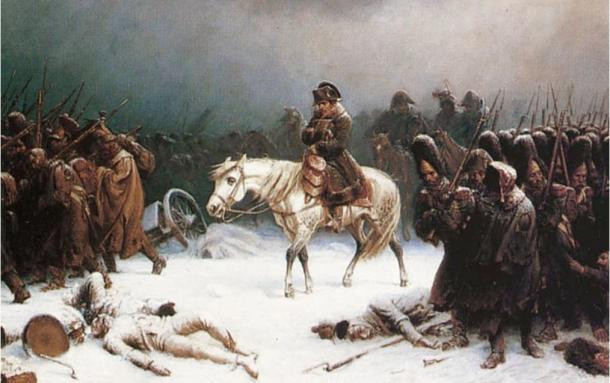Did Napoleon's army die of starvation?

Soldiers belonging to Napoleon's Grand Army that set out to conquer Russia in 1812, may have died due to starvation, researchers believe. Isotope analysis of the remains of the soldiers found in a mass grave point to starvation as the most probable cause of death.
Epidemics like typhus and consuming of dead horse meat could have also caused high nitrogen levels found in the bones.
The analysis of bones and remains of clothing show that most of the soldiers were men aged between 20 to 25 years and that they were from central and western Europe, with a handful being from Italy.
Historical records state that the army of 675,000 men that set out to conquer Russia was down to 100,000 during retreat from Moscow. On reaching Vilnius in Lithuania the numbers further dropped by half.
Around 20,000 soldiers died in Vilnius of hypothermia, starvation, and typhus. Initially the locals burnt the bodies but as the stench was extremely unpleasant, they resorted to mass graves by using the same trenches the soldiers had dug on their way to Russia.
One of the mass graves with 3000 bodies was discovered in 2001 and were subjected to fresh carbon and nitrogen level tests.
Anthropology students Serenela Pelier and Sammantha Holder from University of Central Florida conducted isotope studies on the bones. Carbon isotopes provide information on the carbohydrate portion of the diet, while nitrogen isotopes give data on the protein component.
High nitrogen values
Nitrogen levels are generally higher in carnivorous animals compared to herbivores, but if the body is deprived of protein, nitrogen isotope values tend to shoot up.
This could follow conditions like anorexia, prolonged morning sickness, vitamin D deficiency, and starvation.
Over a quarter of the soldiers had likely succumbed to epidemic typhus, a louse-borne disease resulting in diarrhea, which may have also caused the rise in nitrogen isotopes.
It was also recorded that many of the soldiers resorted to eating flesh of dead or dying horses in the countryside, as food was hard to come by and locals did not trust the army.
However, Holder notes that, given all the available evidence from historical records and previous studies, the "nitrogen enrichment is most likely the result of prolonged nutritional stress".
If she is right, this would be another piece of evidence for the failure of the Russian campaign, Max Owre, executive director of humanities at the University of North Carolina at Chapel Hill told Forbes.
He points out that military logistics then were incapable of supporting a large army.
From 1803 to 1815 Napoleon conquered most of Europe, in his aim to isolate Great Britain economically, France's ultimate rival. Control over Russia was the last part of the plan and though the Czar Alexander I initially signed the Treaty of Tilsit with France to help starve and bankrupt Great Britain, he eventually went back on that.
That prompted Napolean's grand move to conquer Russia.
The members of Napoleon's Grande Armée who died in Vilnius now rest with other war heroes at the Antakalnis Military Cemetery in Lithuania.
© Copyright IBTimes 2025. All rights reserved.





















